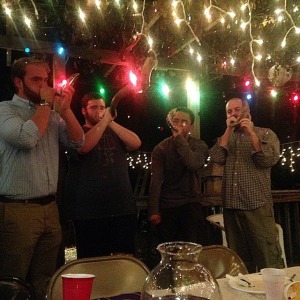Many of those who leave churches and go rogue find a way to express their faith in an interesting place – their homes. (And all pictures in this post are of various Millennial house churches over the past decade!)
 I recently met with friends who lead such a house church and they mentioned one frequent comment they get from people within church businesses: “It sounds nice, but it won’t last.” This naïve view shows how out of touch many Christians in established churches are with both our faith’s history and how church is practiced in the rest of the world.
I recently met with friends who lead such a house church and they mentioned one frequent comment they get from people within church businesses: “It sounds nice, but it won’t last.” This naïve view shows how out of touch many Christians in established churches are with both our faith’s history and how church is practiced in the rest of the world.
As American Christians, we usually assume the way we do church is:
- How people in the rest of the world do church today, and
- How Christians have done church from the beginning.
Both are myths, of course. House churches are extremely common throughout the world today and the early Christians did church in ways that look markedly different from our modern church buildings and businesses.
Throughout the World Today
 House churches are how tens of thousands of missionaries operate in the mission field. Even those working out of offices and in marketplaces tend to open their homes to neighbors and locals to connect with their culture personally. In any area where existing church infrastructure is lacking, missionaries make do with practicing their faith at home and inviting locals to join them.
House churches are how tens of thousands of missionaries operate in the mission field. Even those working out of offices and in marketplaces tend to open their homes to neighbors and locals to connect with their culture personally. In any area where existing church infrastructure is lacking, missionaries make do with practicing their faith at home and inviting locals to join them.
House churches are also how people worship in vast areas without the church infrastructure we’ve come to rely on. In just about any place without existing church buildings, hierarchies of clergy, etc. discipleship of believers in the home is the perfect solution. This occurs in remote villages in developing countries across the world. Even in areas with church buildings, Christians who don’t share the local denominational views meet in homes. A friend shared his experiences with a Protestant house church in Italy, in a community where the only church business is Catholic.
 More than that, meeting in house churches is how the faith is practiced in persecuted regions of the world. This represents a larger demographic than you might expect. From Communist to Islamic regions, dictatorships and areas with one dominant religion that forbids all others, much of the world is not as free for religion as America. A recent report (here: Persecution) listed Christians as the most-persecuted group in the world for the second year in a row, with 90,000 believers killed for their faith in 2016.
More than that, meeting in house churches is how the faith is practiced in persecuted regions of the world. This represents a larger demographic than you might expect. From Communist to Islamic regions, dictatorships and areas with one dominant religion that forbids all others, much of the world is not as free for religion as America. A recent report (here: Persecution) listed Christians as the most-persecuted group in the world for the second year in a row, with 90,000 believers killed for their faith in 2016.
Finally, a new demographic of people worshiping in house churches is rising. In America and other developed nations, many people who leave traditional churches for a variety of reasons are going back to the simple, personal, effective and time-proven community found in house churches. After all, house churches is where it all started.
Where It All Started
 It shouldn’t surprise us that house churches are making a comeback in a generation disgruntled with institutionalized churches. After all, house churches are where Christianity started. It not only started as a grassroots in-the-living-room movement, it thrived that way for centuries.
It shouldn’t surprise us that house churches are making a comeback in a generation disgruntled with institutionalized churches. After all, house churches are where Christianity started. It not only started as a grassroots in-the-living-room movement, it thrived that way for centuries.
It was from house to house that the faith spread across the Roman Empire. Even after Constantine established us as a state-approved faith, believers throughout the world continued meeting in homes and came to dominate the Mediterranean in only a few centuries.
If it worked so effectively then, in a time when millions were disappointed, hurt, and disenfranchised with the ineffectual pagan religions of their day, then it shouldn’t surprise us that house churches serve as the best refuge for the millions today leaving “traditional churches” due to the same frustrations.
Merits of House Churches
So house churches were common from the beginning and remain common today, increasingly so among young believers leaving established churches. Why is this?
 In house churches, Millennials find a practical and effective faith community. They desire a faith that applies to their daily life, and they complain that churches often seem irrelevant with sermons that rarely touch on the day to day troubles they face. Meeting in homes brings faith back into daily life, instead of outsourcing it to a set time slot on Sunday mornings and Wednesday night.
In house churches, Millennials find a practical and effective faith community. They desire a faith that applies to their daily life, and they complain that churches often seem irrelevant with sermons that rarely touch on the day to day troubles they face. Meeting in homes brings faith back into daily life, instead of outsourcing it to a set time slot on Sunday mornings and Wednesday night.
They’re also finding that house churches are a way to avoid some of the common abuses that drove them out of institutionalized churches to begin with. The large overhead costs of maintaining church empires is completely avoided when using your own living room. Shallow teaching can be avoided by digging deeper, accountability can be had more easily, and everyone can have a say in leadership decisions.
Meeting in homes can also limit the size of any group, keeping the community tight knit where honesty and openness are possible without judgment and abuses are quickly and more easily addressed. Millennials are known for wanting more transparency and authenticity, and this is far more common in small groups with peers than in large communities with structured leadership.
When Churches Cease to be Welcoming
House churches also tend to be a safe place to invite the unchurched to give faith a serious look. Many people “would not be caught dead in a church” and many harbor resentments against church people. House churches offer an alternative that appeals to both the anti-church crowd and the church-hurt multitudes in the world.
When I attended established churches and invited friends, I’d frequently get turned down. It’s rare for someone to turn down my invitation to check out our house church  though. Inviting someone for dinner to meet friends and discuss faith is far more personal and meaningful than most of what goes on in the average Sunday morning service. Most people want to discuss faith and yearn for closer relationships, as well as authenticity and safe places for deep and honest talk.
though. Inviting someone for dinner to meet friends and discuss faith is far more personal and meaningful than most of what goes on in the average Sunday morning service. Most people want to discuss faith and yearn for closer relationships, as well as authenticity and safe places for deep and honest talk.
If you invite someone to your church these days, they often won’t be interested. They already know what they’re going to see, and if they aren’t already attending somewhere you can bet it doesn’t appeal to them. Many of us have lost interest in the pep talk sermons, MTV-like worship performances, the awkward fake 5-minute meet-and-greets, the constant guilt-laden invitations to give your money to the institution, and the ho-hum approach to sacraments such as communion and baptism.
 Invite someone to your house to do church and you can be sure they’ll be intrigued. “You guys do church in your living room?!” It’s the difference between “going to church” and “being the church” – hardly a novel concept! Returning to house church models is increasingly popular but is really just rediscovering our beginnings.
Invite someone to your house to do church and you can be sure they’ll be intrigued. “You guys do church in your living room?!” It’s the difference between “going to church” and “being the church” – hardly a novel concept! Returning to house church models is increasingly popular but is really just rediscovering our beginnings.
Let’s be honest. House churches are the next great wave of evangelism.
We are excited that house churches are playing an increasing role in keeping Millennials in the faith, since established churches seem to lack the necessary tool set for the task. And we look forward to sharing more about house church movements, models and testimonies in the coming months! We expect house churches might be a solution to the “The Millennial Crisis” and they will likely spur the next generation to own their faith instead.

I love it! I so want to start a house church this year. We have been doing renovations in order to do that.
LikeLiked by 1 person
Go for it! Some do house church as a supplement to their regular established church, and some do it as an alternative – but either way, it’s definitely a more intimate environment to seek Christ in community more fully!
LikeLiked by 1 person
Jared, I plan to! It will just take some time to prepare the house for it; it is not currently amenable to groups.
LikeLiked by 1 person
Very perceptive blog. I enjoyed reading it
LikeLiked by 1 person
“Being the church” instead of “going to church.” God no doubt smiles upon such commitment and passion. May your tribe increase for all the reasons you site. P.S. Thank you, Jared, for becoming a follower of my blog, From the Inside Out. I pray you’ll find the posts meaningful!
LikeLiked by 1 person
Thanks Jared for your authenticity. As a pastor who recognizes the struggles of traditional fellowships connecting with the new generations, you give me an opportunity to speak frankly to people who don’t understand the shift. God be with you, because all that matters is that people are introduced to Christ, the perfect example of how to love. I look forward to reading more. Peace.
LikeLiked by 1 person
Thank you! One thing we want to encourage all to, is to see that other Christians aren’t in “competition” with them! Whether they go to a church or just a Bible study, a home fellowship or a mission field, a workplace prayer gathering or a school faith club – we’re all in the same family!
LikeLike